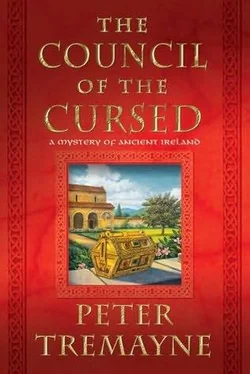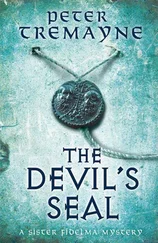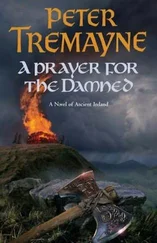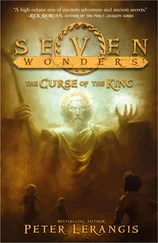Peter Tremayne - The Council of the Cursed
Здесь есть возможность читать онлайн «Peter Tremayne - The Council of the Cursed» весь текст электронной книги совершенно бесплатно (целиком полную версию без сокращений). В некоторых случаях можно слушать аудио, скачать через торрент в формате fb2 и присутствует краткое содержание. Жанр: Исторический детектив, на английском языке. Описание произведения, (предисловие) а так же отзывы посетителей доступны на портале библиотеки ЛибКат.
- Название:The Council of the Cursed
- Автор:
- Жанр:
- Год:неизвестен
- ISBN:нет данных
- Рейтинг книги:4 / 5. Голосов: 1
-
Избранное:Добавить в избранное
- Отзывы:
-
Ваша оценка:
- 80
- 1
- 2
- 3
- 4
- 5
The Council of the Cursed: краткое содержание, описание и аннотация
Предлагаем к чтению аннотацию, описание, краткое содержание или предисловие (зависит от того, что написал сам автор книги «The Council of the Cursed»). Если вы не нашли необходимую информацию о книге — напишите в комментариях, мы постараемся отыскать её.
The Council of the Cursed — читать онлайн бесплатно полную книгу (весь текст) целиком
Ниже представлен текст книги, разбитый по страницам. Система сохранения места последней прочитанной страницы, позволяет с удобством читать онлайн бесплатно книгу «The Council of the Cursed», без необходимости каждый раз заново искать на чём Вы остановились. Поставьте закладку, и сможете в любой момент перейти на страницу, на которой закончили чтение.
Интервал:
Закладка:
‘I do not speak such words lightly,’ Bishop Leodegar replied defensively. ‘The Holy Father has decreed that we should consider two matters very carefully and our decision on them will affect the churches here, in the west. The first and fundamental matter is the central doctrine of our Faith: which declaration of our beliefs are we to adhere to? Do we declare for the Credo of Hippolytus, or do we declare for the Quicunque -the faith of the Blessed Athanasius-or, indeed, should we keep to the words as expressed at the Council of Nicea? It is fundamental. We must ask ourselves what is our belief as followers of the Christ.’
‘ Credo in Deum Patrem omnipotentem; Creatorem coeli et terrae… ’ muttered Eadulf.
‘Indeed, Brother,’ responded Bishop Leodegar, ‘but should we not say ut unum Deum in Trinitate, et Trinitatem un unitate veneremur ?’
Eadulf smiled briefly at the exchange. Was there much difference in expressing a belief in God as Father, Son and Holy Spirit, and a belief in one God in Trinity, and Trinity in unity? Different words that meant the same thing.
‘And is that what this council is about? Simply the form of the words of the Creed, our declaration of Faith?’
Bishop Leodegar’s brows drew together. ‘You should be aware, Brother Eadulf, that among the churches of Gaul, and even among the Franks, the teaching of monothelitism has been developing, contrary to the orthodox interpretation of the Faith. It is therefore important that we have a universal creed, the Rule of our belief.’
‘Monothelitism?’ Fidelma tried to analyse the word from its roots.
‘The teaching of how the divine and human relate in the person of the Christ,’ explained Eadulf. ‘It teaches that Christ had two natures-divine and human-but only one will.’
Bishop Leodegar nodded approvingly. ‘The orthodox interpretation is that Christ had two wills, human and divine, which corresponded to His two natures. But monothelitism has gained favour both in the east and in the west. Honorius, the first of his name to be Holy Father in Rome, has favoured it and so it has spread.’
‘And the council is just to condemn that and agree on a creed?’ Fidelma realised that her knowledge was lacking in the constant arguments and decisions of the various councils of bishops that frequently met to decide what their flocks should or should not believe. She was more concerned with the law of her own country, and she had often questioned her entry into the religious life. It had only been a means to an end for it was the fashion of the five kingdoms for most of those following the professions to enter the religious.
‘It is also for the purpose of agreeing that there should be one Rule for all the religious houses in western Christendom,’ the bishop told her. ‘One set of laws as to how each community should conduct themselves.’
‘One Rule for all communities?’ queried Fidelma, with surprise. ‘But all our religious houses draw up their own Rule according to their individual needs and purposes.’
‘The Holy Father believes such matters should be made uniform through the Faith.’
‘And what standard does he suggest?’ she asked dubiously.
‘It has been suggested that the Rule of the Blessed Benedict, composed over one hundred years ago, should come to define how those in the abbeys and religious houses should govern themselves in their everyday life.’
‘I have heard of the Rule,’ Eadulf said, ‘but Benedict was from a place called Latina. His Rule was fitted for those of the community that he founded there, and it was shaped by his views and culture. Why should his Rule be applied to communities of other lands whose manner of living and culture are so very different?’
‘That is precisely the point of this council, my young Brother in Christ. I am well aware that the Gauls, Armoricans, Britons and the people of Hibernia have their own particular rituals and manners. Indeed, until a few years ago, those rites were also practised among the majority of the Saxons and the Franks. But now we must strive for some uniformity in our beliefs and practices. This, therefore, is an important council. Yet it now stands in danger of disbanding before it has even commenced its deliberations.’
Fidelma was thoughtful. ‘So what is it that you are proposing?’
Bishop Leodegar looked uncomfortable and then he tried to smile.
‘You are direct, Sister,’ he said.
‘It saves time,’ she replied gravely.
‘Very well. What I propose is that you and Brother Eadulf, not being here when the murder was committed and therefore not involved, will have the confidence of the council to investigate this matter and make recommendations as to who is responsible.’
‘How will that save the council?’ Fidelma asked.
‘You, Fidelma, are of the land from where the murdered abbot comes and therefore a good advocate for his rights. Eadulf is a Saxon and as such will not ignore the rights of Bishop Ordgar. You are acceptable to the Hibernians, and Eadulf is acceptable to the Angles and Saxons.’
‘And what about the Britons who are also involved?’ Fidelma queried.
‘I am told that your reputation is known even among them due to some service you performed for the King of Dyfed and the church of the Britons. I am sure that they, too, will accept you as a just advocate.’
Fidelma glanced across to Abbot Ségdae who had remained silent during this time.
‘And this is what you also wish?’ she asked him.
Abbot Ségdae bowed his head in agreement.
‘It is the only just way that I can think of in order to end the dissension which has held up the council during this last week. I think that your brother, the King, would support me in this for, as you know, the matter has repercussions between his kingdom and that of the north.’
Eadulf did not look happy.
‘There are many uncertainties in this matter,’ he pointed out.
‘Which are?’ demanded Bishop Leodegar.
‘Firstly, this matter is over a week old. Doubtless, Abbot Dabhóc has been buried…?’
‘Of course, as is custom,’ replied the bishop.
‘So we are unable to see for ourselves what the wound was, how it could have been delivered, how the body lay on the floor and so on.’
Bishop Leodegar looked surprised. ‘Why is that necessary?’
‘Perhaps not necessary but helpful,’ interposed Fidelma. ‘What we are hearing is that, when everything is pared away and we get down to the basic facts, you have two men, bitter enemies to one another, and we must judge which one of them is telling the truth.’
‘Or which one is telling the lies,’ added Eadulf.
Bishop Leodegar sat back, eyes narrowed. ‘Are you saying that this is impossible to judge?’
‘ Impossibilium nulla obligatio est ,’ Fidelma replied philosophically. ‘If I thought it impossible I would not even be discussing it. We are merely pointing out the difficulties.’
‘So you will undertake it?’ pressed Bishop Leodegar.
‘We will do so,’ she replied after a slight pause.
The man seemed to relax in relief. ‘Then it is agreed?’
‘Do we have freedom to question all those whom we deem it necessary to question?’ asked Fidelma. ‘Do I have that authority from you?’
The bishop looked puzzled. ‘But you only need to question Ordgar and Cadfan.’
Fidelma shook her head. ‘You sound as though you have prejudged matters, Bishop Leodegar. We will not prejudge-not even when it appears a simple choice between one or another. If you want us to proceed then it will be under the conditions that I stipulate or not at all.’
A slight look of annoyance crossed the bishop’s face.
Abbot Ségdae cleared his throat noisily.
Читать дальшеИнтервал:
Закладка:
Похожие книги на «The Council of the Cursed»
Представляем Вашему вниманию похожие книги на «The Council of the Cursed» списком для выбора. Мы отобрали схожую по названию и смыслу литературу в надежде предоставить читателям больше вариантов отыскать новые, интересные, ещё непрочитанные произведения.
Обсуждение, отзывы о книге «The Council of the Cursed» и просто собственные мнения читателей. Оставьте ваши комментарии, напишите, что Вы думаете о произведении, его смысле или главных героях. Укажите что конкретно понравилось, а что нет, и почему Вы так считаете.











